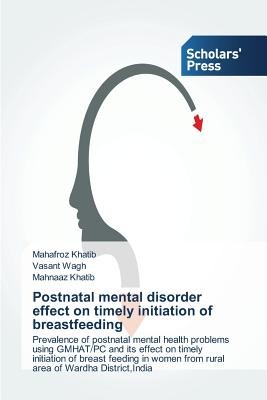
- We will send in 10–14 business days.
- Author: Khatib Mahafroz
- Publisher: Scholars' Press
- Year: 2014
- Pages: 196
- ISBN-10: 3639667387
- ISBN-13: 9783639667387
- Format: 15.2 x 22.9 x 1.1 cm, softcover
- Language: English
- SAVE -10% with code: EXTRA
Postnatal mental disorder effect on timely initiation of breastfeeding (e-book) (used book) | bookbook.eu
Reviews
Description
Prevalence of postpartum mental disorders ranges from 5 to 21 percent depending on the timing and method of assessment and is found to have an influence on the timely initiation of breastfeeding (TIBF). However, community-based epidemiological data on post-partum mental disorders from developing countries and its effect on TIBF are scarce. This study was conducted in rural area of Wardha district, India to assess prevalence of postnatal mental health problems and its effect on TIBF. We assessed 364 women in the post natal period (one week post-delivery) for mental health problems by GMHAT/PC and its influence on TIBF was carried by univariate and logistic regression analyses. Prevalence of postnatal mental health disorders was 60 (16.48%). Among the participants detected with mental disorders, the TIBF was reported by 8 (13.33%) participants. Among these, women with mental disorder symptoms were less likely to timely initiate breastfeeding. Addressing mental health disorder symptoms experienced by women during and after pregnancy may improve TIBF and duration of breastfeeding and may have implications for policies regarding maternal and childcare programmes.
EXTRA 10 % discount with code: EXTRA
The promotion ends in 16d.14:49:18
The discount code is valid when purchasing from 10 €. Discounts do not stack.
- Author: Khatib Mahafroz
- Publisher: Scholars' Press
- Year: 2014
- Pages: 196
- ISBN-10: 3639667387
- ISBN-13: 9783639667387
- Format: 15.2 x 22.9 x 1.1 cm, softcover
- Language: English English
Prevalence of postpartum mental disorders ranges from 5 to 21 percent depending on the timing and method of assessment and is found to have an influence on the timely initiation of breastfeeding (TIBF). However, community-based epidemiological data on post-partum mental disorders from developing countries and its effect on TIBF are scarce. This study was conducted in rural area of Wardha district, India to assess prevalence of postnatal mental health problems and its effect on TIBF. We assessed 364 women in the post natal period (one week post-delivery) for mental health problems by GMHAT/PC and its influence on TIBF was carried by univariate and logistic regression analyses. Prevalence of postnatal mental health disorders was 60 (16.48%). Among the participants detected with mental disorders, the TIBF was reported by 8 (13.33%) participants. Among these, women with mental disorder symptoms were less likely to timely initiate breastfeeding. Addressing mental health disorder symptoms experienced by women during and after pregnancy may improve TIBF and duration of breastfeeding and may have implications for policies regarding maternal and childcare programmes.


Reviews